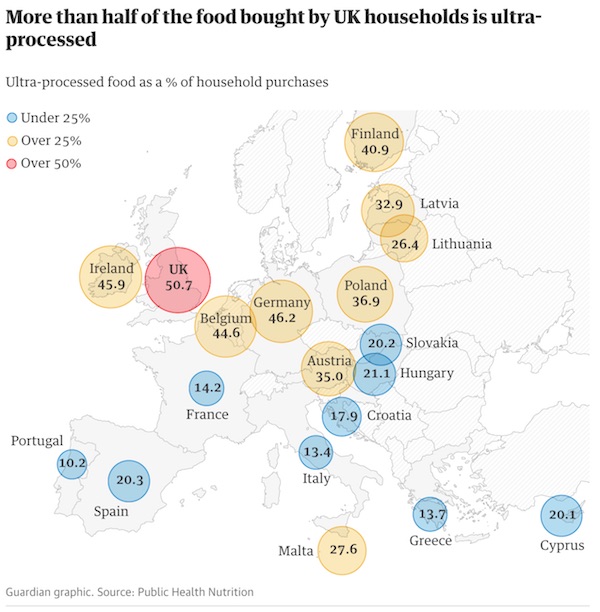
Frank Larson Times Square, New York 1954

The differences in interpretation across the aisle are far more stunning than the memo itself is.
• FISA Memo Released: Here’s What It Says (ZH)
Update: The just released FISA memo accuses senior officials at the DOJ of inappropriately using biased opposition research into then-candidate Trump to obtain surveillance warrants on transition team members as part of the federal investigation into the Trump campaign and Russia. According to the document, information from the the so-called Steele dossier was “essential” to the acquisition of surveillance warrants on Trump campaign aide Carter Page. It claims that then-deputy FBI director Andrew McCabe told the committee in December that without the information from the Steele dossier, no surveillance warrant for Page would have been sought. The memo alleges that the political origins of the dossier — paid for by Hillary Clinton and the DNC — were not disclosed to the clandestine court that signed off on the warrant request.
The document claims that although the FBI had “clear evidence” that the author of the dossier, former British spy Christopher Steele, was biased against Trump, it did not convey that to the surveillance court when making its warrant applications. Steele told then-associate deputy attorney general Bruce Ohr that he was “desperate that Donald Trump not get elected and was passionate about him not being president,” the memo says. House conservatives have touted the memo’s revelations as “worse than Watergate” and hinted that it could prove the undoing of the federal investigation into Trump’s campaign. Meanwhile, Democrats on the panel say that it is a cherry-picked set of inaccurate accusations designed to kneecap special counsel Robert Mueller. They have drafted their own counter-memo to rebut the Republican-drafted document, but the majority voted against immediately making that document public earlier this week.
The memo is based on a slate of highly-classified materials provided to the committee by the Justice Department itself, in a closed-door deal brokered by Speaker Paul Ryan (R-Wis.). Naturally, the DOJ has claimed that the release of the memo is an abrogation of the terms of that deal, an assertion spokesmen for both Ryan and Nunes have rejected. Meanwhile, the underlying evidence remains classified, a state of affairs that Democrats and some national security analysts say makes it impossible to independently verify the memo’s conclusions. As The Hill reported earlier, ahead of the document’s release, Paul Ryan privately urged House Republicans not to overplay the document — and not to tie it to the Mueller investigation.

10 years ago, a drop of 777 was the biggest news on the planet. Today, 666 gets poo-poohed into nothingness.
• Dow Plummets 666 Points, Capping Worst Week In 2 Years (CNBC)
U.S. stocks fell sharply on Friday after a stronger-than-expected jobs report sent interest rates higher. The Dow Jones industrial average dropped 665.75 points to close at 25,520.96, capping off the index’s sixth-largest points decline ever. The 30-stock index also fell below 26,000. Friday also marked the first time since June 2016 that the Dow fell at least 500 points. The S&P 500 fell 2.1% and finished at 2,762.13, with energy as the worst-performing sector. The Nasdaq composite plunged 1.96% to 7,240.95 as a decline in Apple and Alphabet offset a strong gain in Amazon shares. The Dow posted its worst day since June 2016. The S&P 500 and Nasdaq had their biggest one-day fall since September 2016 and August 2017, respectively.
“The key for the market today is rising interest rates,” said Mike Baele, managing director at U.S. Bank Wealth Management. “The old adage is: ‘Bull markets don’t die of old age, they are killed by higher interest rates.’ That looms large.” The U.S. economy added 200,000 jobs in January, according to the Bureau of Labor Statistics. Economists polled by Reuters expected growth of 180,000. Wages, meanwhile, rose 2.9% on an annualized basis. The report sent interest rates higher. The benchmark 10-year yield rose to 2.85% on the back of the report, hitting a four-year high. Investors have been jittery about the recent rise in interest rates, worrying they may be rising too fast. On Friday, the 30-year yield rose its highest level since March.
Bank stocks fell as the yield curve widened. The SPDR S&P Bank exchange-traded fund, which tracks bank stocks, dropped 1.2%. Banks typically benefit from higher interest rates. This has been a volatile week for U.S. stocks. The Cboe Volatility index, widely considered the best fear gauge in the market, rose from 11.08 this week to 17.31.
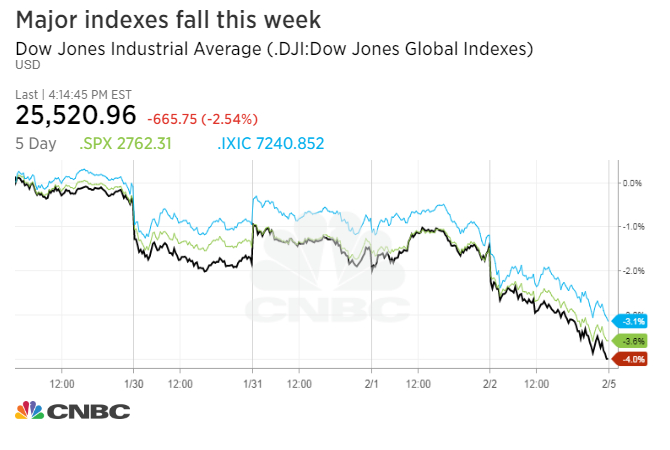

That graph is stunning.
• Did The Market Just Get “Woke?” (Roberts)
Since the beginning of this year, we have been warning of the potential for a correction. Of course, such warnings seemed pointless as the nearly “parabolic” rise in the markets seemed unstoppable. But all of a sudden, something seems to have changed as the market stumbled this past week and has been unable to regain its footing.
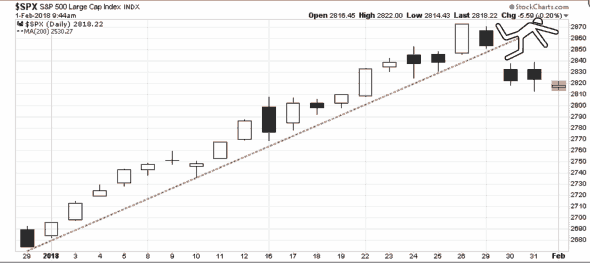
So, what “woke” the markets? Was it the sudden realization that Central Banks globally are reducing Q.E. programs? Or, that economic growth may be weaker than expected given recent numbers? Or, something else? Whatever, the excuse turns out to be, the real culprit is seen in the chart below.
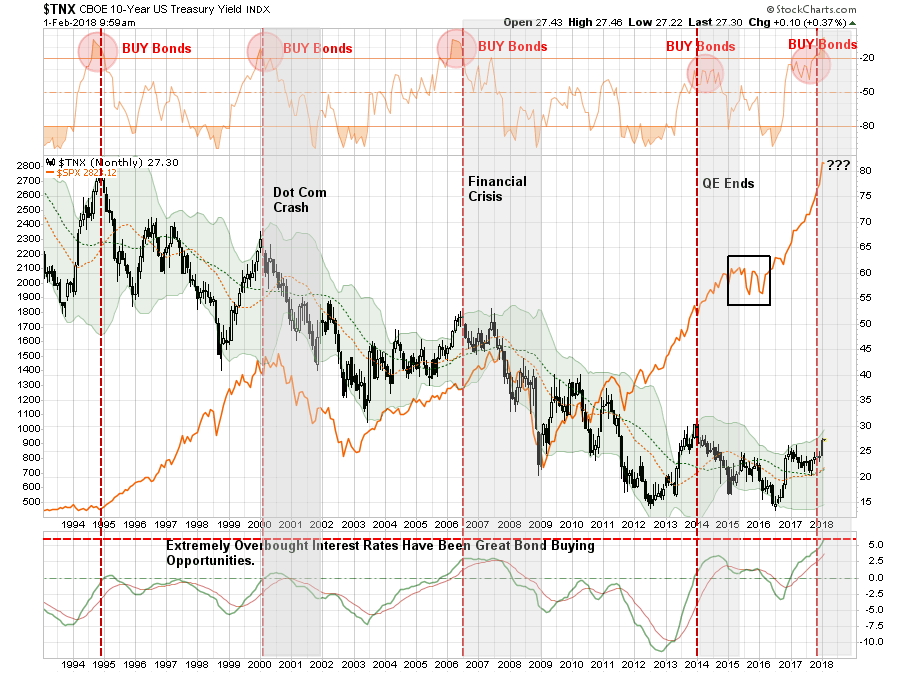

By now, there are some really big losers out there.
• Over $100 Billion Wiped Off Global Cryptocurrency Market In 24 Hours (CNBC)
Over $100 billion was wiped off the global cryptocurrency market in 24 hours on Friday amid concerns over tighter regulation and worries that the bitcoin price was manipulated on a major exchange. The total market capitalization or value of all cryptocurrencies in circulation stood at $405 billion Friday morning New York time, according to data from CoinMarketCap.com, which takes into account the prices of digital coins across a number of key exchanges. This was a fall of $112.6 billion in value from a day before. Cryptocurrencies have seen a major sell-off this week. Bitcoin fell below $9,000 on Thursday and briefly dropped below $8,000 Friday morning, according to CoinDesk’s bitcoin price index, which tracks prices from four major cryptocurrency exchanges.
Other major coins including ethereum and ripple were down 12% and 13%, respectively, compared to a day ago as of 9:58 a.m., ET, Friday. The cryptocurrency world has been plagued by a spate of negative news. India’s Finance Minister Arun Jaitley said the country wants to “eliminate” the use of digital currencies in criminal activities, signaling tighter regulation in the country. The New York Times reported Wednesday that an increasing number of digital currency investors are worried the price of bitcoin and other digital currencies have been inflated by cryptocurrency exchange Bitfinex, which is included in CoinDesk’s price index. Bloomberg reported Tuesday that in December, the U.S. Commodity Futures and Trading Commission subpoenaed Bitfinex and a cryptocurrency company called Tether, which is run by many of the same executives.

What, they figured there was no more profit in there?
• Bitcoin Ban Expands Across Credit Cards as Big US Banks Recoil (BBG)
A growing number of big U.S. credit-card issuers are deciding they don’t want to finance a falling knife. JPMorgan Chase, Bank of America and Citigroup said they’re halting purchases of Bitcoin and other cryptocurrencies on their credit cards. JPMorgan, enacting the ban Saturday, doesn’t want the credit risk associated with the transactions, company spokeswoman Mary Jane Rogers said. Bank of America started declining credit card transactions with known crypto exchanges on Friday. The policy applies to all personal and business credit cards, according to a memo. It doesn’t affect debit cards, said company spokeswoman Betty Riess.
And late Friday, Citigroup said it too will halt purchases of cryptocurrencies on its credit cards. “We will continue to review our policy as this market evolves,” company spokeswoman Jennifer Bombardier said. Allowing purchases of cryptocurrencies can create big headaches for lenders, which can be left on the hook if a borrower bets wrong and can’t repay. There’s also the risk that thieves will abuse cards that were purloined or based on stolen identities, turning them into crypto hoards. Banks also are required by regulators to monitor customer transactions for signs of money laundering – which isn’t as easy once dollars are converted into digital coins.
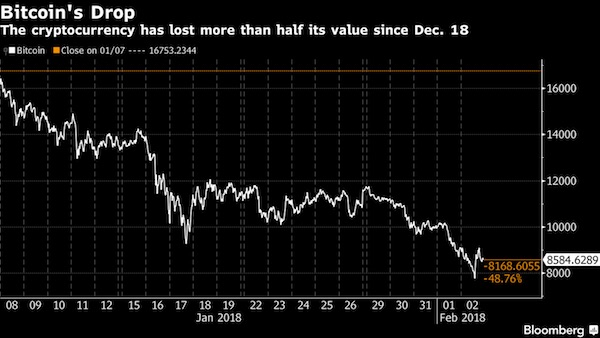

From before the memo release. As I said, it’s the interpretation more than the memo itself.
• Sotu Klaatu Barada Nikto (Jim Kunstler)
The situation certainly puts the nation in a quandary. An uncouth and ridiculous President called forth to battle a vicious, dishonest, bureaucracy and in particular its gigantic, out-of-control “security” apparatus, which appears to have been hijacked by politically interested parties — namely, the minions of Hillary Clinton. You have been reminded here before that history is the supreme prankster. In Fourth Turning terms, the poor old disintegrating USA pined for a “gray champion” and all it got was this booby prize: a Manhattan real estate schmikler with a mean streak. Well, that’s how things roll in a long emergency. And this might only be the beginning of it. In any case, it appears that the FBI, in the hallowed words of Ricky Ricardo, has got some ‘splainin’ to do.
Recall, it was not so long ago that the FBI was run by a cross-dressing maniac addicted to blackmail, so let’s not act as if the agency was something that the Lord Yahweh brought into being on the fifth day of creation, after the lobsters and the cockateels. Granted, J. Edgar Hoover was a hard act to follow, but we are now, evidently, living in an age of even lower men (and women, to be fair). CNN reminded viewers relentlessly last night that The Memo was sure to be a disappointment, a “nothingburger,” for a nation that expects a righteous half-pound beef patty with lettuce, tomato, pickle, and special sauce on a sesame bun. Personally, I expect something more like a three-day-old dead carp in a plain brown wrapper. Maybe “the Resistance” will try to make gefilte fish out of it, which is a burger of sorts: chopped meat, anyway.
Meanwhile, we await the report of DOJ Inspector General Michael Horowitz, who has been rooting around in the same burger den as the House and Senate committees, questioning the same cast of characters. The DOJ report is liable to be more damaging than The Memo. The whole nasty gumball of suspicion and innuendo seems destined to climax in a constitutional crisis. Ludicrous as it seems — like some rogue army out of the stupid Star Wars epic — the “Resistance” bethinks itself the nation’s savior. In the best American tradition, they’ll burn the joint down in order to save it.

Another little Brexit surprise.
• UK Interest Rates Will Rise At The End Of February (G.)
There’s going to be an interest rate rise on 28 February. In just a few weeks you are going to see about 0.25% added to mortgage and savings rates. But you won’t see a press release from the Bank of England that the base rate has gone up. Instead, for the first time in years, banks are going to be scrambling to offer savers better rates – and the losers will be anyone taking out a new mortgage. So what’s happening? On 28 February an extraordinary financial measure, put in place in the days after the Brexit vote, will end. It was called the Term Funding Scheme and was designed to make sure that the 0.25% rate cut in the wake of the shock referendum result in 2016, did actually feed through the financial system (while keeping them profitable). Under the scheme, banks and building societies were able to borrow money from the Bank of England almost for free.
They did so with gusto. They have so far taken £106bn under the scheme, equal to around £3,500 for every working person in the country. Lloyds took £18bn, RBS £14bn, Barclays £10bn, Nationwide £9.5bn and Santander £8bn. Nearly everyone rushed to grab their share: from the tiny Holmesdale building society – which took £4m – through to the Nottingham building society (£395m) and Virgin Money (£4.2bn). Specialist lender Aldermore, which does a lot of buy-to-let mortgages, has drawn £1.4bn from the scheme over a period during which its total net lending has been £1.5bn. It underlines just how important the cash has been. With all this money gushing out of the Bank of England, it has meant that no one has really had to bother chasing savers for their money. So savings rates, already massively depressed by the 2012 Funding for Lending Scheme, were hit further.
But the corner will be turned on 28 February. On that date, the banks and building societies will have to start repaying that £106bn. They’ll have a few years to do it, so maybe I’m being a little dramatic suggesting rates will rise overnight. But let’s say I wouldn’t, right now, lock myself into Lloyds’ one-year bond paying 0.4% or NatWest’s two-year bond paying 0.85%. The banks are going to have to offer much better rates than that to bring the money in. Some of the big banks may pooh-pooh this. Yes, £18bn sounds like a lot for Lloyds, but then it has an £800bn balance sheet, so it’s hardly fatal. But when rivals start offering as much as 3% to get you to move money, banks won’t have a choice but to raise rates. According to Paul Richards, chairman of Insignis Cash Solutions: “It’s likely we will see a 0.25%-0.5% increase in longer-term savings rates over the next 12 months and potentially up to 1% over the next 24-36 months, which could leave a one-year term account getting close to the 3% level.”

Why should the EU feel ‘warned’ about what may happen when the UK is no longer part of the EU?
• Green Brexit Is Impossible To Guarantee, EU Is Warned (G.)
The European Conservative and Reformist group which represents Conservative MEPs has has said Brexit will make it “impossible” to guarantee that current environmental standards can be maintained in Britain or the EU. A leaked document seen by the Guardian also calls for “the closest possible working relationship” between the EU and UK after Brexit, and for a “no regression clause” in future British trade deals. This would “limit any negative effects from deregulation,” says the paper, which was submitted to the European parliament’s Brexit environment steering group. Some Conservative MEPs claimed not to have seen the report that was submitted. The parliament’s Brexit coordinator, Guy Verhofstadt, told the Guardian: “Suggestions that the UK might seek to lower environmental standards after Brexit are alarming and contradict the commitments made by prime minister May in her Florence speech.”
They also showed why a future deal “must contain precise and detailed safeguards, with robust sanctions, to ensure the maintenance of high standards and a level playing field,” he said. The EU’s environmental laws are among its most popular, with polls showing that over 80% of Britons support the same levels of protection – or higher – after Brexit. During the referendum campaign, key government ministers said EU laws such as the birds and habitats directive were “spirit-crushing” and would be scrapped. But Theresa May has sought to defuse fears of conservation backsliding by trying to make the environment a selling point of leaving the bloc. “Let me be very clear,” May said in a speech last month. “Brexit will not mean a lowering of environmental standards.” “We will use the opportunity Brexit provides to strengthen and enhance our environmental protections – not to weaken them.”

Still haven’t seen one word about prosecuting the people behind all this. Incredible.
• German Carmakers Have Lost All Moral Standing (Spiegel)
Starting in 2007, BMW, Daimler, Volkswagen and Bosch maintained a joint lobby organization that was disguised as a research institute. The European Research Association for the Environment and Health in the Transportation Sector (EUGT) purported to dedicate itself to the “environmental-medical effects of road traffic.” But the staff in leadership posts alone shows that the institute was in no way interested in independent research. EUGT head Michael Spallek, for example, had previously spent years employed as a leading company doctor at VW. He retained his VW email address, even after his move to EUGT. The results of the institute’s research were accordingly one-sided. The efficacy of low emission zones in cities that place restrictions on driving cars with high emissions?
There’s no proof, according to one essay the lobby group managed to place in a trade publication for respiratory medicine. Nighttime noise pollution from cars? It’s no problem, as long as it’s continuous. Do diesel emissions cause cancer? Can’t be proven. A short time later, former VW manager and EUGT head Spallek approved the tests with the monkeys. “We have finished our discussions with the company lawyers,” Spallek wrote in an email dating June 14, 2013. The lawyers had given the green light for the study to be carried out, but with one restriction: Non-human primates were to be used instead of human volunteers. Several VW executives at the time were copied in the message, including Stuart Johnson, the head of the company’s Engineering and Environmental Office in the United States.
But it doesn’t appear as though any critical questions were asked. The aim of the experiment with the monkeys had been to deliver definitive proof of how clean “German diesel” really is. The case files compiled by attorney Melkersen illustrate the zeal with which VW’s people organized the test. Nothing was left to chance when engineer James Liang began his journey with a bright-red VW Beetle from California to New Mexico at the beginning of October 2014. The engineer from company headquarters in Wolfsburg, Germany, was already under pressure, even at that point. The U.S. environmental authorities had expressed their doubts about the emissions values of the allegedly squeaky-clean car. VW Chairman Martin Winterkorn had been breathing down his staff’s necks, too. The new diesel models needed to provide the company with a breakthrough in the important U.S. market. As such, anything that might possibly preserve diesel’s environmentally friendly façade had priority.
Which is where the monkeys came in. As of Oct. 2, all final preparations had been made for the test. The VW man moved assiduously around the red Beetle, which had been placed on a chassis dynamometer. The experiment would be led by Jacob McDonald, an athletic young biologist who had quickly risen in his career at the Lovelace Respiratory Research Institute (LRRI). McDonald found it strange that an engineer from Volkswagen would be present for the test. “It’s the first time that I’ve experienced that,” he would later say. And what he really couldn’t grasp was why the VW people wanted to transmit the entire test data in real-time to their research center in California. Engineer Liang had even brought along a transmission device especially for the task.

YouTube has the lowest common denominator down to a T. So let kids see videos of kids beating up kids. They’re sure to keep watching.
• How YouTube’s Algorithm Distorts Truth (G.)
There are 1.5 billion YouTube users in the world, which is more than the number of households that own televisions. What they watch is shaped by this algorithm, which skims and ranks billions of videos to identify 20 “up next” clips that are both relevant to a previous video and most likely, statistically speaking, to keep a person hooked on their screen. Company insiders tell me the algorithm is the single most important engine of YouTube’s growth. In one of the few public explanations of how the formula works – an academic paper that sketches the algorithm’s deep neural networks, crunching a vast pool of data about videos and the people who watch them – YouTube engineers describe it as one of the “largest scale and most sophisticated industrial recommendation systems in existence”.
Lately, it has also become one of the most controversial. The algorithm has been found to be promoting conspiracy theories about the Las Vegas mass shooting and incentivising, through recommendations, a thriving subculture that targets children with disturbing content such as cartoons in which the British children’s character Peppa Pig eats her father or drinks bleach. Lewd and violent videos have been algorithmically served up to toddlers watching YouTube Kids, a dedicated app for children. One YouTube creator who was banned from making advertising revenues from his strange videos – which featured his children receiving flu shots, removing earwax, and crying over dead pets – told a reporter he had only been responding to the demands of Google’s algorithm. “That’s what got us out there and popular,” he said. “We learned to fuel it and do whatever it took to please the algorithm.”

How to make rape, murder and pillage more efficiently. And what does Amnesty say? ‘We’re not against it’.
• Blockchain To Track Congo’s Cobalt From Mine To Mobile (R.)
Blockchain is to be used for the first time to try to track cobalt’s journey from artisanal mines in Democratic Republic of Congo through to products used in smartphones and electric cars. Sources close to a pilot scheme expected to be launched this year say the aim is eventually to give manufacturers a way of ensuring the cobalt in lithium-ion batteries for products such as iPhones and Teslas has not been mined by children. Tracking cobalt presents many challenges as scores of informal mine sites would have to be monitored, all players in the supply chain would need to buy into the scheme, and accurate, electronic data would need to be transmitted from remote areas – all in a vast country plagued by lawlessness.
But companies are under growing pressure from consumers and investors to show the cobalt they use has come through supply chains free of rights abuses, just as they have for minerals used in electronics such as tantalum, tin, tungsten and gold. Businesses in China, the main destination for Congolese cobalt from artisanal mines, have set up a Responsible Cobalt Initiative, which has been joined by tech giants such as Apple and Samsung, to address child labor. The problem they face is that there are few sure-fire ways of tracing cobalt from the informal mines that produce up to a fifth of the cobalt from Congo, the world’s biggest producer. “The demand to make cobalt more sustainable is going to continue growing, meaning there is a will to find a solution and blockchain will be part of that,” said a source with the project.
[..] Sheila Warren, head of blockchain policy at the World Economic Forum, said it was an open question how well it could work in Congo given the prevalence of conflict, lawlessness and an opaque legal system. “We are prototyping, iterating, testing, scaling,” said Warren, who is working with experts to see how blockchain can improve mineral supply chains. “The technology is not the hard part.” Amnesty International, which detailed the extent of child labor in cobalt mining in Congo in a 2016 report, said it was looking at blockchain, especially with a view to tracing payments to middlemen. “You have to be wary of technological solutions to problems that are also political and economic, but blockchain may help. We’re not against it,” said Amnesty researcher Mark Dummett.

It is our governments who are behind this. And our media who don’t tell us about that. How anyone can protest when the Congo is labeled a shithole is beyond me. That takes a very large object up one’s behind.
• Congo Gripped By Fear As Thousands Flee ‘Bone-Chilling’ Violence (G.)
The UN refugee agency has become the latest aid organisation to voice its alarm over rising violence in the east of the Democratic Republic of the Congo that has forced thousands of people to flee their homes. Amid a worsening humanitarian crisis, almost 7,000 people have crossed to neighbouring Burundi and 1,200 into Tanzania in the past week, according to the UN High Commissioner for Refugees. “Refugees we have spoken to say they fled forced recruitment, direct violence and other abuses by armed groups. Others say they fled in anticipation of military operations and out of fear,” said spokesperson Babar Baloch. Earlier this week, the World Food Programme and the Food and Agriculture Organisation described “alarming food insecurity” in the country, sparked by an extension of conflict into areas previously considered stable, such as the provinces of Kasai and Tanganyika.
Last month, Jean-Philippe Chauzy, DRC’s chief of mission for the International Organisation for Migration (IOM), said the humanitarian crisis in DRC was at “breaking point” amid a massive escalation of inter-ethnic conflict and widespread insecurity. The number of people coping with extreme hunger has risen by 2 million over the past six months, reaching 7.7 million – about 10% of the population. More than 4 million children under the age of five are at risk of acute malnutrition, said the agencies. “The humanitarian situation in the DRC is at breaking point, as is our capacity to respond to extremely limited funding,” said Chauzy. “The stories that Congolese who have been forced from their homes are telling are bone-chilling. They have been through so much already – torture, rape and murder of their loved ones. We cannot stand idly by as they suffer in silence.”

Without WikiLeaks, we’d be stumbling even more in the dark. We don’t do nearly enough to protect them. We let whoever claim that Assange is some Russian agent, and we owe him a lot more respect than that.
• WikiLeaks Has Published Leaks On Trump Admin And Russia, Seeking More (CJ)
Democrats believe that Assange is a Trump-supporting Kremlin asset while Trump supporters believe Assange is a based MAGA hat-wearing ally to their cause, the former because they were told to believe that by CNN and the Washington Post and the latter because they’ve seen him championed by Fox’s Sean Hannity and the elaborate 4chan hoax “QAnon”. Neither could be further from the truth. Today Assange responded to a call for transparency on Trump “tax returns, corporate records, campaign emails, and other documents relevant to Donald Trump’s Russia/WikiLeaks connections” from toxic neocon David Frum with the words “Go for it” and a link to WikiLeaks’ leak submission service. This is not the first time WikiLeaks has solicited documents on the Trump administration, and it won’t be the last.
Since long before the election and continuing through to the present, WikiLeaks has been harshly criticizing the president’s refusal to release his tax returns and publicly asking for leakers to submit them. They are on record trying to persuade Donald Trump Jr to do the same in a conversation that has been spuriously criticized but which when examined impartially is plainly just a leak publishing outlet soliciting a potential source. More importantly, WikiLeaks has already published Trump administration leaks. Its Vault 7 and Vault 8 leak drops exposing the CIA’s scary surveillance and hacking tools are comparable to NSA leaks from Edward Snowden against the Obama administration, and much like the Obama administration’s vindictive backlash against Snowden we are seeing similar retaliation from the Trump administration for the CIA leaks.
Trump’s CIA Director has pledged to shut down WikiLeaks as “a non-state hostile intelligence service often abetted by state actors like Russia,” and his Attorney General has statedthat Assange’s arrest is a priority, which Trump himself has said he would permit. Mike Pompeo’s increasingly vitriolic and threatening rhetoric about WikiLeaks is reminiscent of Joe Biden’s labeling Assange a “hi-tech terrorist” eight years ago. WikiLeaks in reality is not a friend of Republicans anymore than it’s a friend of Democrats, because WikiLeaks is and always will be first and foremost an enemy of corrupt power. The liberals who used to love Assange when he was dropping leaks about the Bush administration now hate him, and the conservatives who used to attack him as an enemy now celebrate him as a hero. This dynamic will necessarily switch again when more leaks drop and conservatives see clearly that Assange’s principles are not for sale.

An epic tale for future historians. When we found how to feed ourselves, all of us, with good food, we decided not to do that. There’s some deeper meaning there, we don’t have the ability to do this right. We may be smart, but only superficially. And moreover, if we did get it right, we’d end up with 30-40 billion people here. So we poison ourselves.
• ‘Ultra-Processed’ Products Now Half Of All UK Family Food Purchases (G.)
Half of all the food bought by families in the UK is now “ultra-processed”, made in a factory with industrial ingredients and additives invented by food technologists and bearing little resemblance to the fruit, vegetables, meat or fish used to cook a fresh meal at home. Research by global nutrition experts reveals the scale of our food evolution, from farm-fresh to factory-manufactured. “Real food” has been replaced by salty snacks and sugary cereals, industrially-made bread and desserts, ready-meals and reconstituted meats alongside sweetened soft drinks. The study of 19 European countries is published this month in a special issue of the journal Public Health Nutrition. It shows that UK families buy more ultra-processed food than any others in Europe, amounting to 50.7% of the diet.
Germany comes second, on 46.2% and then Ireland on 45.9%. While the figures are not directly comparable, extracted from national surveys carried out differently and from different years, the trend is clear. The UK data they analysed came from the Living Costs and Food Survey 2008, the latest available. They categorised foods into four groups. More than a quarter of food (28.6%) was unprocessed or minimally so, 10.4% was processed cooking ingredients such as vegetable oil and 10.2% was ordinarily processed, such as cheese or cured meat. Ultra-processed food amounts to more than all the other groups combined.
Professor Carlos Monteiro from the University of Sao Paulo in Brazil, who led the research team, told the Guardian of his deep concern about the links between ultra-processed food with obesity and poor health. Ultra-processed foods may look attractive and are designed with sweet or salty tastes that make us want more. But there is nothing nutritious about them, Monteiro said. “Take breakfast cereals. If you take Froot Loops, for instance, more than 50% is sugar,” he told the Guardian. “[But] there is no fruit … “Ultra-processed foods are essentially new creations of the food industry with very low cost ingredients in a very attractive product.”
